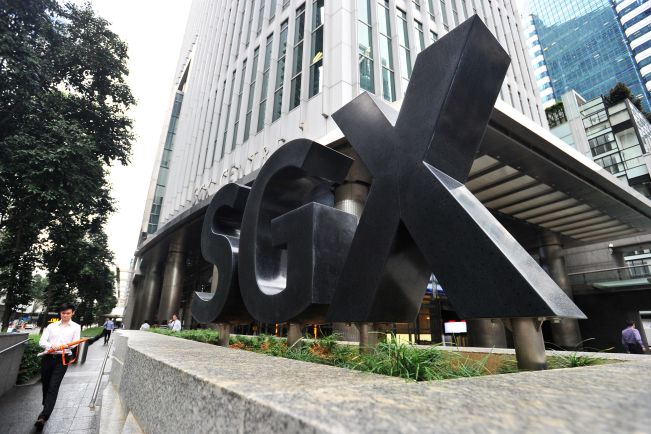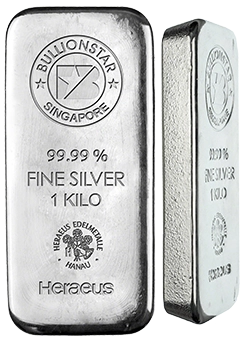SGX Kilobar Gold Contract vs. Trading with BullionStar
When Singapore Exchange (SGX) launched a physically-delivered gold kilobar contract in October 2014, there was much fanfare from the contract’s promoters (SGX, World Gold Council, IE Singapore and the Singapore Bullion Market Association) that the SGX Gold Kilobar would kick-start exchange-based gold kilobar trading in the Singapore gold market, while providing liquidity, price discovery and a gold price benchmark for the Singapore region.
The Demise of SGX’s Kilobar Gold Contract
However, these much-hyped benefits never materialised, since despite a relatively active start, trading in the kilobar contract never gained traction and is now essentially flat-lining at zero trading volume, even after some supposedly volume boosting changes introduced by the SGX in December 2015. In SGX Kilobar Gold Contract trading, 6 consecutive business day contracts trade at any one time, and when one contract expires, another is added. Settlement can occur on a daily basis, which, for each lot, consists of delivery and receipt of a batch of 25 kilobars of gold.
At launch in mid-October 2014 through to end of December 2014, the SGX kilobar gold contract saw 152 lots traded. Following this, the entire 2015 volume only reached 158 contracts, with only 4 contracts traded in the fourth quarter of 2015 (2 lots in December 2015, zero lots in November 2015, and 2 lots in October 2015). This means that throughout Q4 2015, only 100 gold kilobars were delivered/received.
In December 2015, in response to these embarrassingly low trading volumes, SGX introduced three changes. These changes:
a) extended trading hours from the a 3-hour window spanning 8:30am – 11:30am Singapore time to a 6.5 hour period spanning 9:00am – 3:30pm
b) introduced a ‘short position’ transfer process under which sellers who don’t have the gold to deliver can transfer their positions to local bullion banks, so as to address seller default sceanarios
c) erased the previous procedure whereby a seller had to direct a participating bullion bank (a Gold Delivery Agent) to ‘attest’ that the gold being sold conformed to the contract’s specifications (specifications such as fineness and approved refinery)
SGX also waived clearing fees on the contract until 31 March so as to “promote market activity".
Judging by the contract’s trading volumes, these December 2015 tweaks to the contract have had absolutely no effect on trading volume. In fact, trading volumes have actually fallen to practically zero since the beginning of 2016. In its ‘Market Statistics Report’ for March 2016, SGX reveals that the SGX Kilobar Gold contract recorded zero trading volume in March 2016, zero trading volume in February 2016, and volume of only 1 contract in January 2016. Therefore, for the first 3 months of 2016, only a single gold kilobar contract lot has traded, and the first quarter 2016 volume did not even match the tumbleweed fourth quarter of 2015.
Why has the SGX Gold Kilobar contract failed?
Perceived Liquidity issues
Lack of trading volume will always deter potential participants on any exchange, since if there’s is a perception of low liquidity, participants will stay away. In the case of the SGX Gold Kilobar, market participants appear to find it more efficient to continue to trade in the OTC market, a market which offers greater flexibility, and where premiums on kilobars are derived from actual supply and demand and from arbitraging locational differences between Singapore, London and elsewhere.
Inflexible Quantity
The SGX Gold Kilobar contract is inflexible in that delivery is in the form of a sealed box of 25 x 1 kilo bars of gold. All bars in the box have to be from the same producer, and the buyer has no control over brand of bar purchased, having to accept one of seventeen approved brands. The high quantity threshold also excludes a gold buyer, who, for example, may want to purchase 10-15 kilobars, but not 25 kilobars.
Delivery to the SGX Approved Vault
Gold kilo bars can only be sold through the contract if they reside in the Approved Vault (Brinks vault in Singapore Freeport). This requires the bars to have either a) remained in the Approved Vault with the box unopened, or b) been received in directly from an approved refinery, or c) been sent in from the vault of one of the ‘Recognised Forwarders’ in Singapore (Certis CISCO, G4S, Loomis, Malca-Amit, or Brinks second Singapore vault). The approved vault operator (Brinks) ensures that bars received into its vault fulfill these criteria.
Delivery from the SGX Approved Vault
Gold traded under the SGX Gold Kilobar contract is delivered at the Approved Vault in Singapore. So a buyer of gold through the contract has to then decide how to collect this gold from the Approved Vault. SGX has recently added two other delivery locations, Bangkok and Hong Kong, using three banks, Bank of Nova Scotia, JP Morgan and ICBC Standard, but delivery in these cities involves extra delivery fees, and is “subject to each bank’s availability of physical gold."
Convoluted account setups
The account setup requirements for trading and taking/making delivery of gold in the SGX Kilobar Gold contract are quite involved. Trading the contract requires opening a futures trading and clearing account with an SGX Clearing member, which itself involves associated account opening procedures, trading access set-up steps and declarations. There are also trading fees and clearing fees, and reporting requirements. The account then needs to be funded and have a margin facility set up.
Delivery of gold under the contract makes use of a complex account convention called a Kilobar Gold Accounts (KGA). KGAs represent allocated gold holdings held under the contract with Brinks Singapore, the approved vault operator, at the approved vault, Brinks vault at the Singapore Freeport. Anyone trading the SGX contract who wishes to take or make delivery of gold must open a KGA, in one of 3 ways.
A KGA can be opened with a Gold Delivery Agent (GDA) (one of the contract’s market makers) who can either create a customer specific KDA or specify the KGA within an omnibus account structure. Another option is to set up a KGA through an SGX clearing member who in turn will account for the gold via an omnibus KGA account with one of the GDAs, or with Brinks Singapore. A third option is to open a KGA directly with Brinks Singapore Pte Ltd in the form of a Brinks customer KGA. This option involves entering a standard account opening process with Brinks and also signing a ‘Rider’ with Brinks that addresses the SGX custody contract under which Brinks provides services to Singapore Exchange Derivatives Clearing (SGX-DC). Since the gold is ultimately held at Brinks vault, there are storage charges, gold bar transaction charges, as well as transport charges for moving gold from the Freeport vault to somewhere else in Singapore, such as Brinks main Singapore vault.
Only banks can directly trade the contract
Natural participants in the gold market such as refineries and jewellery companies cannot trade the SGX gold kilobar contract directly. They have to trade via banks. When the contract was launched in October 2014, only 4 market makers were appointed, and these market makers were required to be category 1 members of the Singapore Bullion Market Association. The four original 4 market makers for the contract were JP Morgan, Bank of Nova Scotia, Standard Bank and Standard Chartered Bank. These category 1 SMBA members also played a role in the contract as Gold Delivery Agents (GDAs) until December 2015.
SGX Counterparty and Default Risk
It’s still possible for an SGX Gold Kilobar contract to end with cash-settlement, in which case SGX imposes a 10% penalty on one of the parties. There is still also potential default risk, which can arise after the transfer of a short position in the scenario in which the new short also fails to deliver the contracted gold.
BullionStar Flexibility
Compare, for example, the above complexity and rigidity of the SGX Kilobar Gold contract to the ease and simplicity of buying or selling physical gold kilobars through BullionStar in Singapore, with which I’m familiar.
Account Opening
The BullionStar account opening process is very simple and only takes a couple of minutes to complete (either online or in store).
Product Flexibility
When buying gold from BullionStar, the customer can place an order to buy or sell gold bars in any quantity with complete flexibility on brand choice. A customer can choose to purchase 25 x 1 kilo gold bars if they so wish, or can choose any quantity of kilobars, in a mixture of available gold bar brands from some of the world’s most prestigious precious metals refineries and mints. Indeed, with BullionStar, a customer can choose to purchase or sell any available gold bar size, such as 100 gram gold bars, or any available gold coin products, or any other precious metals.
Payment Flexibility
Unlike the SGX Kilobar Gold contract which trades in US Dollars per gram, with BullionStar prices are quoted in Singapore Dollars, US Dollars, Euros and Bitcoin, and purchases can be paid for using any of these currencies. Payment mechanisms are also flexible, including bank transfer, cash, NETS (in Singapore Dollars), and cheque, and again using Bitcoin.
Pricing and Transparency
BullionStar’s gold and other precious metal range is sourced from some of the most highly regarded precious metals refineries and mints in the world such as Germany’s Heraeus, Switzerland’s PAMP, the Royal Canadian Mint, and the Perth Mint of Australia. BullionStar’s website clearly displays the price premium of every product carried compared to the world gold price, as well as the product’s spread between buy and sell price. This ensures the entire transaction process is fully transparent.
Transaction Flexibility
With BullionStar, customers can buy gold and other precious metals online, and request home delivery, or else buy and arrange to pick up their metal at the store, or else purchase metal online and put it into ‘My Vault’ storage in BullionStar’s secure vault storage facility. Alternatively, customers can walk in and buy gold and other precious metals over the counter at BullionStar shop and showroom premises in Singapore. This physical accessibility also applies to customers being able to walk in to the BullionStar store to deposit gold for storage, walk in to audit their stored gold without appointment, and also walk in to withdraw bullion holdings held in the vault.
Besides allocated bullion products, with BullionStar clients also have access to the Bullion Savings Program (BSP). This is an ultra-flexible and very low entry cost option to buy gold in units of 1 gram and upwards. BSP customers can buy and sell any time, 24 hours a day, 7 days a week. Once 100 grams, or multiples of 100 grams, have been accumulated in the program, a BSP customer can convert these 100 gram holdings into physical bullion in the form of 100g PAMP cast bars. The BSP is fully-backed by precious metals holdings, in fact it has a backing greater than 100%.
No reporting requirements
With BullionStar precious metals transactions, there are no external client reporting requirements. This ensures the highest degree of anonymity possible when trading precious metals.
Conclusion
Some radical changes appear to be needed to the SGX Gold Kilobar contract if it’s to attract critical mass and appeal to a wider variety of trading participants. This may include the need for greater flexibility in lot size. However, competing Singapore-based exchange, ‘ICE Futures Singapore’, launched a physically-deliverable 1 kilo lot gold futures contract in November 2015, but this too has seen tiny trading volumes, negligible open interest, and zero deliveries (zero issues and stops) since launch date.
Singapore supports a large and vibrant gold market. For example, in 2015, 113 tonnes of gold were exported just from Switzerland to Singapore. But merely looking at exchange volume of the SGX Kilobar Gold contract and the ICE Singapore kilobar gold contract will fail to capture the big picture. It appears that in Singapore and surrounding regions, buyers and sellers of gold kilobars continue to prefer the flexibility of OTC trading, the very flexibility that BullionStar provides on a number of fronts as highlighted above.
Popular Blog Posts by Ronan Manly
 How Many Silver Bars Are in the LBMA's London Vaults?
How Many Silver Bars Are in the LBMA's London Vaults?
 ECB Gold Stored in 5 Locations, Won't Disclose Gold Bar List
ECB Gold Stored in 5 Locations, Won't Disclose Gold Bar List
 German Government Escalates War On Gold
German Government Escalates War On Gold
 Polish Central Bank Airlifts 8,000 Gold Bars From London
Polish Central Bank Airlifts 8,000 Gold Bars From London
 Quantum Leap as ABN AMRO Questions Gold Price Discovery
Quantum Leap as ABN AMRO Questions Gold Price Discovery
 How Militaries Use Gold Coins as Emergency Money
How Militaries Use Gold Coins as Emergency Money
 JP Morgan's Nowak Charged With Rigging Precious Metals
JP Morgan's Nowak Charged With Rigging Precious Metals
 Hungary Announces 10-Fold Jump in Gold Reserves
Hungary Announces 10-Fold Jump in Gold Reserves
 Planned in Advance by Central Banks: a 2020 System Reset
Planned in Advance by Central Banks: a 2020 System Reset
 China’s Golden Gateway: How the SGE’s Hong Kong Vault will shake up global gold markets
China’s Golden Gateway: How the SGE’s Hong Kong Vault will shake up global gold markets






 Ronan Manly
Ronan Manly 0 Comments
0 Comments












